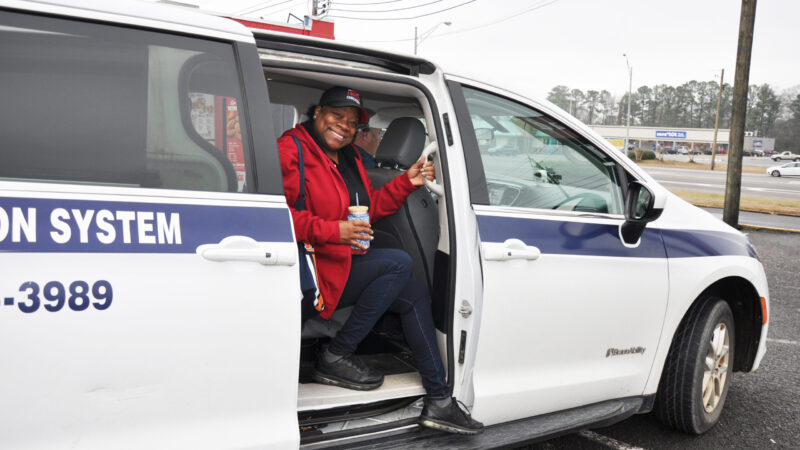Alabama Economy: Homeless
One client stands out, with meticulous makeup, styled hair, and wearing a fashionable black dress with a fur collar. She doesn’t want to give her name (so we’ll call her Margo), but she will share her story. After Margo’s divorce, she moved in with her mother and brother in her parent’s home. Recently, though, her mother had to move to a nursing home, and the family had to sell the house to help pay for her care.
“I lived with my girlfriend awhile and she felt very sorry for me, of course, and she had just gotten an apartment, and I moved in with her. The apartment complex found out I was in there, and had to leave, and it was very sudden.”
For now, Margo calls the First Light shelter “home”. And as the economy worsens, so do a growing number of women. The shelter’s executive director Ruth Crosby says the shelter only has so much space for clients and when it runs out, they’re forced turn some women away.
“It’s very sad. We always try to never turn a woman away with a child. Always get them to where they’re safe, and can get something to eat. But, our overflow shelter is supposed to house about 15, and we have consistently for the past month, had twenty or more in there. So, we have seen a lot and turned away a lot.”
Some of the men and women looking for shelter do have mental health issues and are chronically homeless. But, others find themselves in a situation they would’ve never dreamed of, just a few months ago.
“I was living in Tuscaloosa. I was working.”
When the bad economy hit Jacquelyn Harris, it hit her hard.
“They cut back where I was working and I turned around and lost my apartment and couldn’t pay rent. So, trying to move a 16-year and a baby at the same time, and look for housing. There’s no place in Tuscaloosa I could come, so they told me to try up here.”
Homeless advocates say Harris’ story is typical. Just down the road from First Light, The Old Firehouse Station men’s shelter is also seeing record numbers. Director Steve Freeman says increasingly there’s a new type of client, men from the suburbs, with families.
“We’ve had a man, recently, who came to the shelter, whose house was foreclosed. He lost his job, and I think a couple of months afterward, where he couldn’t afford to pay the house payment, and it was foreclosed on him. And, they ended up on the streets.”
Advocates say many people are teetering on the economic edge. First Light’s Deb Everson says sometimes it doesn’t take much to send them reeling.
“It’s like that house of cards. So, all it takes is one of those cards at the bottom of the stack that’s so important, such as job, car, rent; for those bottom cards in the stack to be removed, the whole stack of cards is going to come crashing down.”
And it’s not just individuals that get pinched. Because of the bad economy, donations to shelter themselves are down while costs are up. At the Old Firehouse Shelter, fuel costs have gone up by half and the overall budget has risen about 25 percent, while donations are down 30 percent from this time last year. Again, director Steve Freeman.
“What that means for a small agency, that is very dependent on non-restricted revenue, is we have to make cutbacks. And, so last year, we made cutbacks of three staff members. In the overall scheme of things, that may not seem like much, but that was about 25 percent of our staff. So, it makes it that much more difficult for us to get individuals off the street.”
And homeless advocates are worried. They say historically, January and February is when their resources are most stretched. But with record numbers of homeless people looking for services right now, that doesn’t bode well for the coming winter months.
Surgeon general nominee Means questioned about vaccines, birth control and financial conflicts
During a confirmation hearing, senators asked Dr. Casey Means about her current positions and her past statements on a range of public health issues.
Kalshi reveals insider trading case against editor for MrBeast
With prediction markets booming, so have concerns about insider trading. Now, Kalshi has disclosed its first public actions against accounts suspected of trading on confidential information.
Greetings from Jordan’s Wadi Rum desert, where patches of green emerge after winter rains
Wadi Rum's otherworldly landscape is where Star Wars movies and The Martian were filmed. In late winter, plants emerge in this desert — but some are toxic to camels, so their herders must protect them.
Lack of transportation keeps many Alabamians from working. Rural public transit programs are trying to help
While lack of transportation is a major employment barrier in Alabama, few people take public transit to work. That dynamic is even more pronounced in rural areas.
When a horse whinnies, there’s more than meets the ear
A new study finds that horse whinnies are made of both a high and a low frequency, generated by different parts of the vocal tract. The two-tone sound may help horses convey more complex information.
Hundreds of American nurses choose Canada over the U.S. under Trump
More than 1,000 American nurses have successfully applied for licensure in British Columbia since April, a massive increase over prior years.






